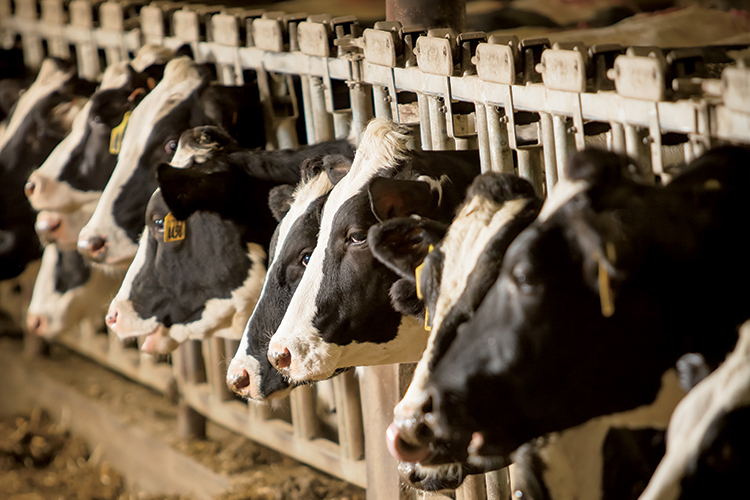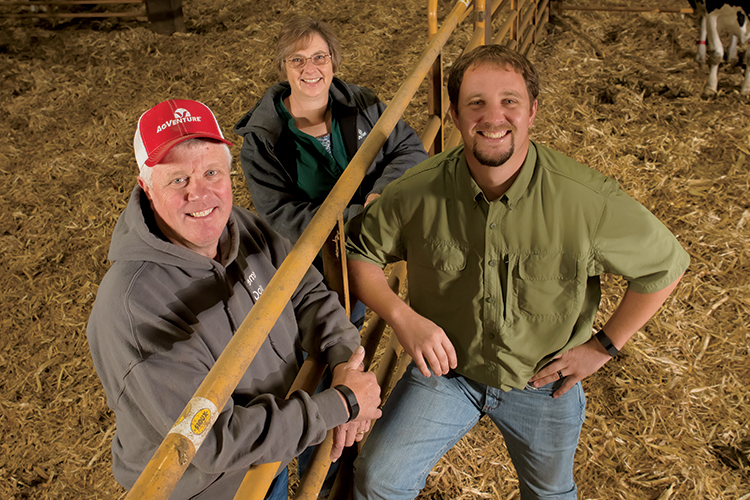Home > Nebraska > Nebraska Crops & Livestock > Nebraska Dairy Farmers Go Above and Beyond for Animal Care
Nebraska Dairy Farmers Go Above and Beyond for Animal Care
 Brothers Bill, Tom and Ron Thiele of Clearwater can tell you a thing or two about the dairy business – how much milk a cow is capable of producing or how milk gets from their farm to a grocery store cooler.
Brothers Bill, Tom and Ron Thiele of Clearwater can tell you a thing or two about the dairy business – how much milk a cow is capable of producing or how milk gets from their farm to a grocery store cooler.
But the Thiele brothers are equally passionate about taking excellent care of their cows. Since 1994, the family has expanded its dairy from 300 cows to more than 1,700 today, and animal welfare is at the top of their priority list.
![Nebraska Agriculture 2017 [INFOGRAPHIC]](https://eadn-wc01-4177395.nxedge.io/wp-content/uploads/2020/05/Screen-Shot-2017-02-16-at-1.19.05-PM-264x320.jpg) “We practice animal care every day. Clean, dry and comfortable is our mantra, whether it’s a newborn calf or the oldest cow in the pasture,” Bill Thiele says. “We have zero tolerance for pushing the cows too hard or abusing them in any way. We tell our 25 employees, ‘It’s the cows who sign your paycheck, not us. So care for them like you would care for your own mother.’ ”
“We practice animal care every day. Clean, dry and comfortable is our mantra, whether it’s a newborn calf or the oldest cow in the pasture,” Bill Thiele says. “We have zero tolerance for pushing the cows too hard or abusing them in any way. We tell our 25 employees, ‘It’s the cows who sign your paycheck, not us. So care for them like you would care for your own mother.’ ”
Thiele Dairy
The Thiele brothers are third-generation farmers, with Tom’s son, Scott, and Ron’s son, Luke, being the fourth generation. Some of the ways they ensure their cows are comfortable include using sand bedding in the stalls and a high-tech barn with tunnel ventilation.
“Twice a week we add new sand to the stalls, and an automatic flush system recycles the sand, separating the solid manure to be used as fertilizer,” Thiele says. “Newer barns have a lot of technology. Our barn is insulated, which keeps it 15 degrees cooler in the summer than outside temps, and we control the humidity to limit moisture in the air, which may create problems for the cows.”
Thiele Dairy’s newest facility handles 250 cows per hour for milking, and that efficiency means the cows spend more time relaxing.
“We milk each group in less than an hour from the time they leave the pen until they return,” Thiele says. “Shorter time standing on their feet lets them rest more and helps with their reproduction, hoof health and overall health.”
![Nebraska Agriculture 2017 [INFOGRAPHIC]](https://eadn-wc01-4177395.nxedge.io/wp-content/uploads/2020/05/Screen-Shot-2017-02-16-at-1.18.56-PM-317x320.jpg) The Thieles even monitor each cow with RFID (radio-frequency identification) tag technology.
The Thieles even monitor each cow with RFID (radio-frequency identification) tag technology.
“We know exactly how much milk a cow gives. If it deviates from the norm, we know she has a problem even before she does, and we get her in for a medical evaluation,” Thiele says.
Special attention is afforded to calves during the critical first four and a half months after they are born.
“People often don’t realize the attention to details we pay with baby calves,” Thiele says. “We don’t even trust they will drink enough colostrum,” which is a form of milk produced by the mother that contains antibodies to protect against disease. “So we collect it, grade it and only use the good and excellent quality colostrum to feed them. A baby calf is our entire future, so we take excellent care of it from the word go.”
Temme Dairy
In Wayne, Doug Temme and his wife, Mary, run Temme Dairy with their son, John, who joined the dairy in 2009. Like the Thieles, they continually look for new technologies that keep their herd of 750 cows comfortable.
“We know that the better we take care of our animals, the better they will take care of us,” Doug Temme says. “There are always people who think farmers don’t care. But they don’t see us out with the animals when it’s cold in a blizzard making sure they get fed and milked. The public doesn’t see the work that goes into it.”

Temme says that even as they have expanded their operation, the care for their animals remains a priority.
“As we’ve grown, it has actually gotten easier to care for the cows, because instead of having to multi-task, we have someone assigned to care for the calves, another person in charge of herd health, another person making sure stalls are properly bedded and so on,” he says. “We are able to hire people who take specific care of the cows at all times.”
The family also raises corn and alfalfa on 1,100 acres, which is used to feed the cows. John manages the dairy with the help of several employees, while Doug focuses on the crops. For Doug and Mary, it has been rewarding to see their son come back home and join the dairy business. John’s college roommate works for them as well.
“It’s nice to see young people actively involved in the dairy business,” Doug says. “John has always taken interest in the dairy. He tagged along with me when he was little and could feed a calf a bottle even before he started school.”



